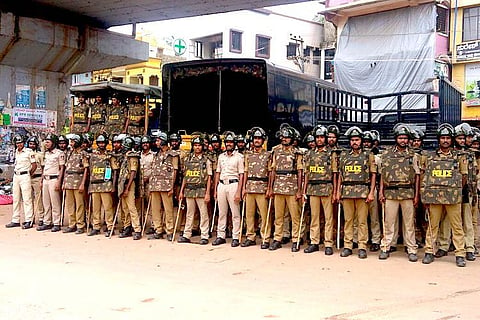

An eerie silence had enveloped BC Road, a highway, in Dakshina Kannada’s Bantwal district. While most of the shops remain closed, a select few had half-opened shutters, in case there was a need to lock down immediately.
Sitting at the cash register in his department store, Mohammed Shohaib casually dismisses Saturday’s stone pelting incident when a vehicle carrying the body of RSS volunteer Sharath, who died of injuries on Friday, passed the BC Road junction.
“That’s not new for us. These kinds of incidents keep happening here. We were informed by the people conducting the procession a day in advance that we had to shut shop or they would end up damaging the store. So, I had not bothered to open the store at all. Now I am not bothered by such incidents. They have become a routine,” Mohammed said. BC Road has been a hotspot of communal tension and has seen many riots in the past.
Just like Mohammed, the residents and the shop owners on BC Road too have become immune to communal clashes in the area.
Saying that there was nothing shocking about the incident, Ramesh Ramchandra, a resident of the area and the owner of a breakfast joint said, “There is nothing shocking about this. Everyone expected some kind of destruction on that day. These groups are always waiting for a chance to perpetuate violence against one another.”
“The poor man’s funeral was a ripe opportunity. Even the thought that these groups will try to make peace is a joke. They hate each other vehemently, but this situation is dangerous because they don’t know why they hate each other. This kind of brainwashing is decades old. It won’t go away so soon,” Ramachandra adds.
Although many like Mohammed and Ramesh have accepted the communal clashes as a routine, people in the area say they always have to be alert and quick in order to escape in case someone decides to strike and hurt them.
Khaleelullah, a shop owner in the area says he diligently shuts shop at 6pm and is home by 7pm. “It is better to go back home before sun down but you never know. I have read about people getting hacked to death in broad daylight. It’s not like violence happens every day. But it also true that it can happen at any time. It is not perpetuated by people who are affiliated with groups only. The hatred is in every common person. We should be alert. It’s better to be safe, right?” he adds.
Hatred based on religion is confined to members of organised fundamentalist groups in Dakshina Kannada. So, says Dinesh Ulepady, a social activist and lawyer, who is currently working on the Prashanth Poojary murder case.
“This hatred has spread across the social structure of Dakshina Kannada and has infected a huge part of the police, bureaucracy and the media too. The situation in the district has worsened so much that it is very easy to find someone on the road, who will say religion matters the most and that it will factor in their voting behaviour. There are so many stories of friends fighting and couples breaking up because of religion. That kind of hatred runs deep and difficult to wash off,” Ulepady says.
“The people had voted for the Congress government as they have never been involved in perpetuating violence. They came to power with promises of putting an end to communal violence. They could have conducted harmony building activities in these past years but once they came to power all promises took a back seat,” Ulepady says.
While the hope of a peaceful society has not completely died down, with each incident of communal clash that hope begins to fade a little.